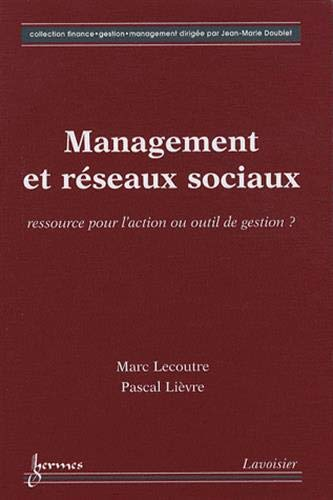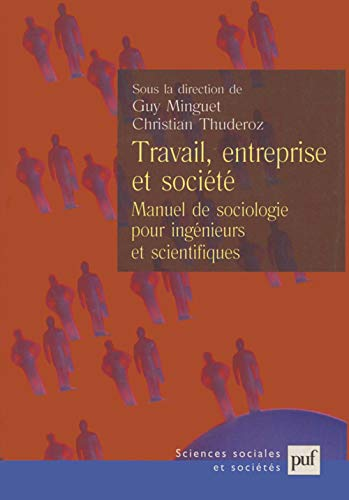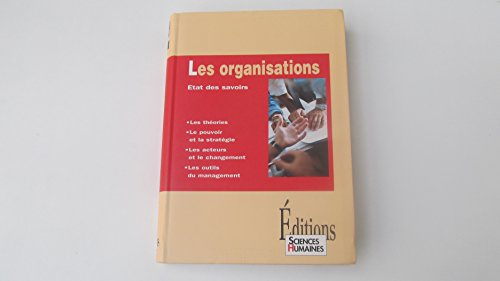 Accueil
Accueil
DĂ©tail de l'auteur
Auteur Michel Ferrary |
Documents disponibles écrits par cet auteur (22)


 Affiner la recherche
Affiner la recherche
Article : document Ă©lectronique
La loi Copé-Zimmermann de 2011 impose un quota minimum de 40 % d’un même sexe dans les conseils d’administration (CA). Elle illustre le rôle des pouvoirs publics et de la contrainte légale pour promouvoir la mixité femmes-hommes au sein des inst[...]
Article : document Ă©lectronique
Three main mechanisms explain women’s labor force placement: employer discrimination, gendered educational choices and professional preferences. The labor market evolves in a cultural context which is infused with stereotypes about men’s and wom[...]
Article : document Ă©lectronique
L’analyse de la féminisation des effectifs et de l’encadrement des 50 plus grandes entreprises privées françaises montre une forte hétérogénéité. Trois mécanismes sociaux interagissent pour expliquer cela : la discrimination, les choix éducatifs[...]
Article : texte imprimé

Article : texte imprimé

Article : texte imprimé
Armand Hatchuel ; Olivier Basso, Éditeur scientifique ; Valérie Blanchot-Courtois ; Alain Fayolle, Éditeur scientifique ; Michel Ferrary ; Sébastien Ronteau ; Thomas Durand ; Emile-Michel Hernandez ; Gilles Garel ; Pascal Le Masson ; Benoît Weil ; Véronique Bouchard |
Article : texte imprimé
Didier Retour, Éditeur scientifique ; Rachel Bocquet ; Caroline Mothe ; Ariel Mendez ; Manuela Bardet ; Rodolphe Colle ; Jean-Denis Culié ; Christian Defélix ; Florian Hatt ; Marie-Thérèse Rapiau ; Michel Ferrary ; Pierre-Yves Gomez ; Christian Seux ; Nicolas Leterrier |
Article : texte imprimé
Michel Ferrary ; Sébastien Brion, Éditeur scientifique ; Caroline Mothe, Éditeur scientifique ; Gilles Garel ; Rodolphe Rosier ; Fanny Simon ; Albéric Tellier ; Sawsen Dhifallah ; Valérie Chanal ; Christian Defélix ; Sébastien Brion ; Mareva Sabatier |
texte imprimé
Lise Mounier ; Marc Lecoutre, Éditeur scientifique ; Pascal Lievre, Éditeur scientifique ; Arnaud Banoun ; Mohamed Bayad ; Michaël Benedic ; Laurent Bertrandias ; Isabelle Bories-Azeau ; Frédéric Bornarel ; Pascal Brassier ; Marie-Jeanne Bright ; Franck Brulhart ; Christelle Bruyère ; Marina Burakova-Lorgnier ; S. Burt ronald ; Pierre Chaudat ; Vincent Chauvet ; Barthelemy Chollet ; Jean-Pierre Claveranne ; Sophie Claye-Puaux ; Catherine Comet ; Fabien Coutarel ; Karine Delamaire ; Fabien Eloire ; Claude Fabre ; Patrick Faillenet ; Michel Ferrary ; Mickaël Geraudel ; Charles Gueye ; Rania Labaki ; Emmanuel Lazega ; Stéphane Leymarie ; Anne Loubès ; Véronique Magista ; Raphaël Nkakleu ; Valérie Pallas-Saltiel ; Christophe Pascal ; Elise Penalva-Icher ; Johann Petit ; David Piovesan ; Marie Raveyre ; Marjorie Renaud ; Evelyne Rouby ; Anne Rousseau ; Karine Roux ; Christophe Schmitt ; Jean-Claude Taddéi ; Paola Tubaro ; Philippe Valoggia ; Séverine Ventolini | Paris : Hermès | Finance-Gestion-Management | 2008Si le réseau social apparaît comme une ressource pour l'action, est-il possible de l'envisager délibérément comme un outil de gestion ? Comment la présence d'un tel capital social améliore-t-il le fonctionnement d'une organisation ? Comment les [...]
Article : texte imprimé
Michel Callon ; Michel Ferrary, Éditeur scientifique ; Mark Granovetter ; Philippe Pierre, Éditeur scientifique ; Michel Grossetti ; Jean-François Barthe ; Christophe Beslay ; Michel Ferrary ; Marie Raveyre ; Stéphanie Loup ; Agnès Paradas ; Olivier Roque ; Valérie Mieville-Ott ; Raphaël Lavoyer ; Alexandre Largier ; Lise Boily ; Eric Mellet |
Article : texte imprimé

Article : texte imprimé
Christophe Baret, Éditeur scientifique ; Isabelle Huault, Éditeur scientifique ; Barthelemy Chollet ; Emmanuel Lazega ; Thierry Picq, Éditeur scientifique ; Guillaume Soenen ; Catherine Comet ; Michel Ferrary |
texte imprimé
La compétition entre les entreprises prend aujourd'hui une dimension où les connaissances sont considérées comme un avantage concurrentiel. La question de la connaissance sera considérée au travers des objets (entreprise, organisation, Etat, soc[...]
Article : texte imprimé
Jean-François Chanlat, Éditeur scientifique ; Fabien Blanchot, Éditeur scientifique ; Jean-Jacques Pluchart ; Frédéric Wacheux, Éditeur scientifique ; José Allouche ; Patrice Laroche ; Annick Bourguignon ; Olivier Saulpic ; Philippe Zarlowski ; Florent Noël ; Shimon L. Dolan ; S. Tzafrir shay ; Yehuda Baruch ; Anne Sachet-Milliat ; Christophe Falcoz ; Michel Ferrary |
texte imprimé
Christian Thuderoz, Éditeur scientifique ; Guy Minguet, Éditeur scientifique ; Jacques Bélanger ; Jérôme Cihuelo ; Thomas Debril ; Hélène Denis ; Michel Ferrary ; Patrice Flichy ; Sarah Ghaffari ; Armand Hatchuel ; Romain Laufer ; Pascal Le Masson ; Florence Osty ; Thomas Reverdy ; Gwenaële Rot ; Dominique Vinck ; Pierre Veltz ; Benoît Weil | Paris : PUF - Presses universitaires de France | Sciences sociales et sociétés | 2005Manuel destiné à aider les ingénieurs et les scientifiques à mieux comprendre et gérer les technologies, les innovations, l'efficience organisationnelle et la fiabilité technique. Le travail d'ingénierie, les échanges dans les réseaux scientific[...]
texte imprimé
Yvon Gattaz, Préfacier, etc. ; Michel Rousseau, Éditeur scientifique ; François Fillon, Préfacier, etc. ; Michel Barabel ; Jérôme Beche ; Alain Capiez ; Peter Van Cleef ; Gérard Kokou Dokou ; Michel Ferrary ; Nicole Girlando ; Isabelle Huault ; Birgit Klohs ; Gaël Le Boulch ; Olivier Meier ; Hadj Nekka ; Guillaume Schier | Paris : Economica | Connaissance de la gestion | 2004Issu pour partie d'un colloque tenu à Angers début 2002, cet ouvrage analyse les fondements de la création de valeur dans les régions et met en avant les expériences réussies de développement et de réseaux d'entreprises en proposant des outils e[...]
Article : texte imprimé
Patrick Cohendet ; Alan Kirman ; Jean-Benoît Zimmermann ; Michel Grossetti ; Marie-Pierre Bès ; Geert Duysters ; John Hagedoorn ; Charmianne Lemmens ; Frédéric Deroïan ; Alexandre Steyer ; Olivier Dupouet ; Murat Yildizoglu ; Ludovic Dibiaggio ; Michel Ferrary ; Nicolas Curien ; Emmanuelle Fauchart ; Guillaume Haeringer ; Sylvie Thoron ; Sanjeev Goyal ; José Luis Moraga-Gonzales ; Michel Delapierre ; K. Mytelka lynn ; Robin Cowan ; Nicolas Jonard |
Article : texte imprimé

texte imprimé
Charles-Henri Besseyre des Horts ; AGRH - ASSOCIATION FRANCOPHONE EN GESTION DES RESSOURCES HUMAINES (2000; PARIS) ; Aahad Osman-Gani ; Blandine Ageron ; David Alis ; Christophe Baret ; Jocelyne Barreau ; Patrick Gilbert ; Yves-Frédéric Livian ; Frédérique Pigeyre ; Christoph I. Barmeyer ; Christel Beaucourt ; Pierre Louart ; Hazem Ben Aissa ; Pierre Béret ; Ariel Mendez ; Claude Paraponaris ; Nadine Richez-Battesti ; Jeffrey Berman ; Dominique Besson ; Slimane Haddadj ; Franck Biétry ; Olivier Devin ; Isabelle Bories-Azeau ; Frank Bournois ; Christian Defélix ; Didier Retour ; Pascal Brassier ; Loïc Cadin ; Anne-Françoise Bender ; Véronique de Saint Giniez ; Judith Pringle ; Mélanie Caillaud ; Didier Cazal ; Lionel Chambrier ; Bruno Henriet ; Brigitte Charles-Pauvers ; Zhong-Ming Wang ; Xiaoping Liu ; Shaohui Chen ; Marie Wilson ; Paul-Marc Collin ; Annie Cornet ; Giseline Rondeaux ; Franck Brillet ; Eric Davoine ; Björn Walliser ; Jean-Charles Riera ; Christèle Dondeyne ; Marc Dumas ; Tony Edwards ; Chris Rees ; Jean-Paul Faisant ; Christophe Falcoz ; Olivier Merignac ; Elaine Farndale ; Chris Brewster ; Geneviève Feraud ; Michel Ferrary ; Valérie Santonja ; Lawrence Gales ; Cordula Barzantny ; F. Geary john ; William K. Roche ; Paul J. Gollan ; Bérangère Gosse ; Éric Vernier ; Sylvie Guerrero ; Mounir Hadj-Mouri ; Chris Hendry ; Katherine Hutchings ; Mark Shadur ; Robert Mcellister ; Alexander Iellatchitch ; Wolfgang Mayrhofer ; Terence Jackson ; Cindy David ; Satish Deshpande ; Janice Jones ; Jacob Joseph ; F. Lau k. ; Ken Matsuno ; Chiaki Nakano ; Hun-Joon Park ; Joanna Piorunowska-Kokoszko ; Iwao Taka ; Hidekil Yoshiwara ; Thierry Jacquot ; Sébastien Point ; Jacques Jaussaud ; Johannes Schaaper ; Zhong-Yu Zhang ; Steve Jefferys ; Alain Klarsfeld ; Tamara Kondrachova ; Jean-Louis Chandon ; Alain Roger ; Désirée H. Ladwig ; E. Domsch michel ; Jacqueline Laufer ; Eirinn Larsen ; Florence Laval ; Véronique Guilloux ; Michel Kalika ; Stéphane Le Queux ; S. Ostenfeld ; M. Bray ; J. Connell ; J. Ewer ; P. Waring ; R. Zeffane ; Annaïg Le Roux ; Ginette Legault ; Claudette Ross ; Carole Lamoureux ; Evelyne Léonard ; Monica Lindgren ; Johann Packendorff ; Désiré Loth ; Françoise Lozier ; Eléonore Marbot ; Jean-Marie Peretti ; Marguerite Martinon ; Mohammed Matmati ; Karim Mazouli ; Peter Mcgraw ; Estelle Mercier ; Pierre-Xavier Meschi ; Yves Moulin ; Margarette Mucy ; Coralie Mugnai ; Maral Muratbekova ; Barbara Myloni ; K. Harzing anne-wil ; Valérie Neveu ; Florence Noguera ; Ewan Oiry ; Valérie Outteryck ; Sandra Palmero ; Woo-Sung Park ; Gyu-Chang Yu ; Yung-Ho Cho ; Danielle Picard ; Jean-Michel Plane ; Jean-Jacques Pluchart ; Karinne Poirey ; Patricia Pol ; Philippe Robert-Demontrond ; Nicolas Rolland ; David Rolland ; Diane-Gabrielle Tremblay ; Eduardo Davel ; Olivier Roques ; Denise M. Rousseau ; Zipi Shperling ; Chris Rowley ; John Benson ; Stéphanie Rozan ; Pierre-Yves Sanséau ; Jean-Yves Saulquin ; Aline Scouarnec ; Zahir Yanat ; Jean-Pierre Segal ; Michael Sheehan ; J. Jordan peter ; Deborah Shepherd ; Gilles Simard ; Monir Tayeb ; Kathryn Thory ; Sandra Thonon ; Jean-Yves Le Louarn ; Julie Tixier ; Michel Tremblay ; Philippe Guay ; Georges-Xavier Trepo ; Gouveia De Vasconcelos isabella ; Carvalho De Vasconcelos flavio ; Marc Valax ; Patrick Valéau ; Christian Dave ; Bertrand Venard ; Catherine Voynnet Fourboul ; Marie Waxin | Paris : ESCP-EAP | 2000La mondialisation de l'économie questionne la gestion des ressources humaines. Les entreprises multinationales sont, à cet égard, un terrain d'observations qui alimente les recherches en management comparé. Les comparaisons internationales perme[...]
Article : texte imprimé
Jean-Marie Peretti ; Renaud de Rochebrune, Préfacier, etc. ; David Alis ; Michèle Amiel ; Anne-Françoise Bender ; Jean-Luc Bernaud ; Loïc Codin ; Benoît Cherre ; Michel Ferrary ; Jérôme Hubler ; Jacques Igalens ; Estelle M. Morin ; Frédérique Pigeyre ; Véronique de Saint Giniez ; Géraldine Schmidt ; Bruno Sire ; Michel Tremblay ; Philippe Zarifian ; Jeffrey Pfeffer ; Bernard Deconink ; Maurice Thévenet |Le retour du travail est traité au travers de trois thématiques. La première est celle des facteurs exogènes qui remettent en cause la gestion du travail, notamment la loi sur les 35 heures, mais aussi l'ensemble du contexte économique, politiqu[...]
texte imprimé
Henry Mintzberg ; Philippe Cabin, Éditeur scientifique ; Norbert Alter ; Chris Argyris ; Michel Bauer ; Rachel Beaujolin ; Sandra Bellier-Michel ; Philippe Bernoux ; Claudie Bert ; Alexandrine Civard-Racinais ; Bertrand Collomb ; Michel Crozier ; Jean-François Dortier ; Eugène Enriquez ; Michel Ferrary ; Erhard Friedberg ; Denis Guigo ; Maurice Hamon ; Rémi Hess ; Hervé Laroche ; François Lautier ; Jean-Claude Moisdon ; Bernard Monassier ; Michel Moullet ; Alex Mucchielli ; Dominique Oberle ; Guy Pelletier ; Jean-Daniel Reynaud ; Bernard Roy ; Jean-Claude Ruano-Borbalan ; Renaud Sainsaulieu ; Jean-Michel Saussois ; Maurice Thévenet ; Georges Trepo ; Michel Villette ; Benoît Weil ; Oliver E. Williamson ; Martha Zuber | Auxerre : Sciences humaines | 1999Cet ouvrage collectif sur les organisations comporte les thèmes suivants : les sciences de l'organisation, théories et modèles ; le pouvoir et la stratégie ; les acteurs et le changement et les outils du management.
Article : texte imprimé
Du point de vue de l'économie des institutions, l'analyse du marché du travail distingue les pratiques de gestion de l'emploi relevant d'une logique marchande d'allocation des ressources, la flexibilité externe, de celles découlant d'une logique[...]






